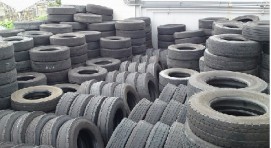Finding Gold in Scrap Tires
 The Problem: 10 Billion scrap tires are stockpiled around the world. They bring the danger of fire, as well as rodent and mosquito habitat, and groundwater pollution to the communities where they’re stored. Over 1.5 Billion more tires are added every year. As developing nations become developed, the number of scrap tires will increase beyond even these staggering figures.
The Problem: 10 Billion scrap tires are stockpiled around the world. They bring the danger of fire, as well as rodent and mosquito habitat, and groundwater pollution to the communities where they’re stored. Over 1.5 Billion more tires are added every year. As developing nations become developed, the number of scrap tires will increase beyond even these staggering figures.
The best solutions to date have been to grind or burn the tires or bury them in landfills. Burning, usually in cement kilns, creates thousands of tons of greenhouse gasses and dioxin emissions. Grinding uses a small number of tires and costs more than the end product brings on the market. Landfills are not the right place for tires. They break down very slowly and pollute the soils and water for hundreds of years.
Disposal fees and government subsidies have funded all of the above “solutions”, but the tires keep piling up faster than we can deal with them.
The Solutions: Mobius is a project development by Klean Industries Inc, that says it can make a tidy profit on scrap tires without government subsidies, be virtually pollution-free, and produce marketable carbon products, fuel recycled from the tires, carbon credits to sell in the international market, and remanufactured tires that are as good or better than new tires.
How can they do it? Tire recycling, with technology that has been in operation in Japan for more than ten years; a sealed system that indirectly heats the tires in the absence of oxygen and recovers original materials used to make the tire in the first place. The heat comes from some of the products of the tire recycling process; syn-gas and heavy oil. Steel, carbon black, and diesel fuel are the marketable products recovered from the tires. Emissions are less than the exhaust from the trucks that bring the tires to the plant.
It doesn’t stop there. As tires come in, high-quality tires will be sorted by size and brand to be remanufactured into new tires. These are not old fashioned retreads. The casings, after thorough inspection with brand new high-tech equipment from Germany & Japan, are heat pressed with new rubber sidewalls and tread in the same process as new tires.
Mobius tires will carry a warranty equal or superior to any other brand on the North American market. There are already fleet operators and government agencies ready to buy. Fleet operators get an equal or better tire at a better price, and in the U.S., the 1998 Presidential Executive Order 12873 led to the Environmental Protection Agency’s ‘Guideline for Federal Procurement of Retread Tires’, which requires that all federal, state and local government agencies — as well as contractors in receipt of federally funded contracts – must purchase remanufactured tires, or utilise tire remanufacturing services, to the maximum extent practicable.
Klean & Mobius see scrap tires as a valuable resource. What has been lacking is the refining techniques to bring the refined products to market. As the cost of tires rises with global demand and higher raw material costs, remanufactured tires will have a competitive advantage, and our other refined products (carbon black, diesel oil, and steel) will also be more valuable.
Where everyone else saw a monumental environmental problem, the Klean Team saw a golden opportunity.
- Zero reliance on government subsidies. Virtually all large-scale tire recyclers or disposal methods require significant economic subsidization from governments or consumers.
- Tire remanufacturing has significant profit margins.
- The carbonization technology utilized is commercially proven and generates stand-alone profits.
- Production of significant carbon credits.
Super Clean Web 2.0 WordPress Business Template - Debonair WordPress Theme created by Artivity exclusively for ThemeForest.
